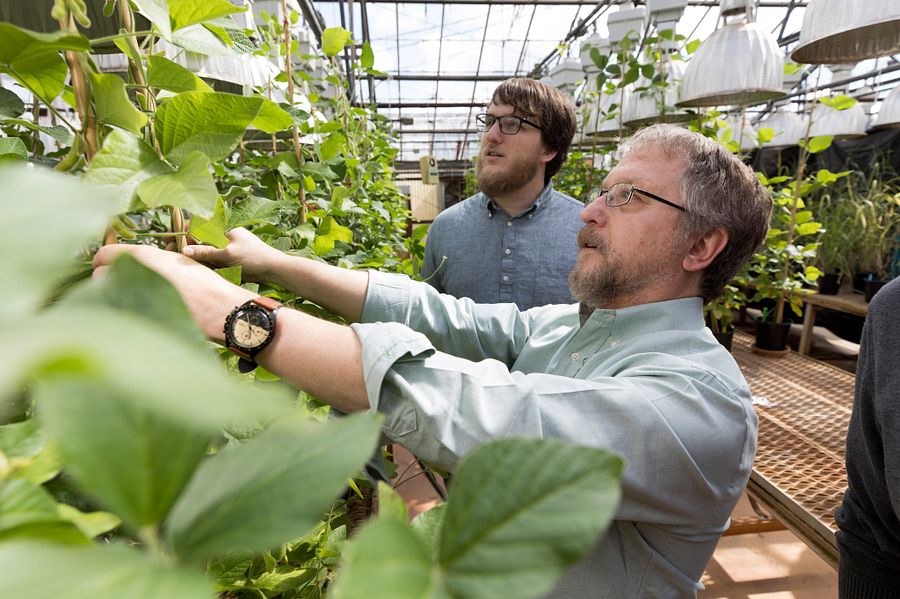CAES produces Ph.D. plant breeders ready for top green industry jobs
CAES produces Ph.D. plant breeders ready for top green industry jobs
By Amanda Budd

[Evan McCoy, left, and Wayne Parrott look up to trellised soybeans, growing in a UGA greenhouse among rows of tables full of soybeans and other plants]
Institute of Plant Breeding, Genetics and Genomics Director Wayne Parrot, pictured at right, looks at gene expression in soybean plants with graduate student Evan McCoy inside a UGA greenhouse. (Photo by Andrew Davis Tucker/UGA)
Recent data shows that the University of Georgia College of Agricultural and Environmental Sciences produced the third-most plant-breeding Ph.D. graduates between 2015 and 2020.
Graduates from the plant breeding, genetics and genomics Ph.D. program from the Institute of Plant Breeding, Genetics and Genomics (IPBGG) go on to work at the forefront of the field of plant genetics, often developing crops to be as efficient and productive as possible to meet demands for fresh food while using less land and resources.
With over 80% of alumni employed at public or private institutions, the program ranked highly for its graduate employment rate.
Wayne Parrott, IPBGG director, said he is proud of the institute for making such impressive strides since starting in 2008. He attributes the center’s success to a knowledgeable faculty and the foundations upon which the program was built.
“Our goal was not to be just another program, but to be one of the best,” said Parrott. “We set our metrics very high from the beginning, both for our admissions standards and expectations for students.”
Parrott noted one of the reasons the program has been successful is thanks to the work of past director Peggy Ozias-Akins.
Clint Steketee graduated from the IPBGG program in 2018 and now works to ensure corn quality for Syngenta.
Ozias-Akins, who recently stepped down for Parrott to take on the role, said she focused on building the program to be as beneficial as possible for potential students.
“We worked to build visibility for the program in order to first attract outstanding students and enhance connections with potential employers, then provided students with a breadth of formal and informal educational and professional development opportunities,” said Ozias-Akins. “Students are encouraged to develop their soft skills in addition to technical skills, both important for employment and professional growth in a diverse and global society.”
Alumni Clint Steketee and Chandler Levinson reflect fondly on their time in the program.
Steketee works for Syngenta as a corn breeding project specialist today and said he appreciated the soft skills he learned at IPBGG that now allow him to effectively lead.
“Beyond the practical knowledge I gained, I had two great advisors that taught me how to work well with teams and gave me ideas of what sorts of opportunities are out there in terms of plant breeding careers,” said Steketee. “It prepared me in terms of the kind of professional development and people skills that you need in order to be successful in a modern breeding career.”
Chandler Levinson, who graduated from IPBGG in 2021, recently completed a postdoctoral position at the University of California and joined Bayer as a product development breeder.
Levinson, who now works for Bayer as a product development breeder for sweet and hot peppers, emphasized the relationships she had the opportunity to build and how the opportunities provided by IPBGG helped further her professional development.
“The two things I miss most are my lab that had become like a family to me, and the endless opportunities to apply to. Our lab worked together to accomplish huge tasks like planting and harvesting whole fields by hand — we really came together to support each other,” said Levinson. “IPBGG also had endless career advancement opportunities ranging from the Boerma and Burton scholarships to free soft skills and technical workshops offered year-round. There was always something I could join or apply to in my downtime to better my education.”
Parrott is proud of the program for providing a strong curriculum that brings together traditional plant-breeding methodology with modern genomics and other technology. He is looking forward to building the program to provide additional opportunities and support for students going forward.
In addition to the Ph.D. program, IPBGG has a master’s degree program in plant breeding, genetics and genomics that sets students up for similar positions in the field.
To learn more about what IPBGG offers its students, visit plantbreeding.caes.uga.edu.
Amanda Budd is a writer with the University of Georgia College of Agricultural and Environmental Sciences.
